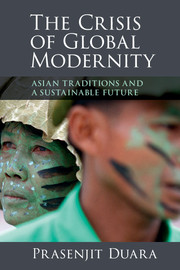Book contents
- Frontmatter
- Epigraph
- Contents
- List of figures and maps
- Preface and Acknowledgements
- Introduction
- 1 Sustainability and the crisis of transcendence
- 2 Circulatory and competitive histories
- 3 The historical logics of global modernity
- 4 Dialogical and radical transcendence
- 5 Dialogical transcendence and secular nationalism in the Sinosphere
- 6 The traffic between secularism and transcendence
- 7 Regions of circulation and networks of sustainability in Asia
- Reprise and Epilogue: of reason and hope
- Bibliography
- Index
- References
1 - Sustainability and the crisis of transcendence
Published online by Cambridge University Press: 05 January 2015
- Frontmatter
- Epigraph
- Contents
- List of figures and maps
- Preface and Acknowledgements
- Introduction
- 1 Sustainability and the crisis of transcendence
- 2 Circulatory and competitive histories
- 3 The historical logics of global modernity
- 4 Dialogical and radical transcendence
- 5 Dialogical transcendence and secular nationalism in the Sinosphere
- 6 The traffic between secularism and transcendence
- 7 Regions of circulation and networks of sustainability in Asia
- Reprise and Epilogue: of reason and hope
- Bibliography
- Index
- References
Summary
Three developments in the present century frame my study: the rise of Asia – in particular, China; the crisis of planetary sustainability; and the decline of transcendent and universalist ideals. To what extent are Chinese and Indian intellectuals and activists beginning to address these issues? I will first consider some Chinese approaches and subsequently also turn to Indian responses. The rise of China has been accompanied by a palpable need to understand the significance of this ascendance and project a vision of the world – a universalism – that does not reproduce the injustices of the earlier orders, whether under the empires or modern imperialism.
The Asian tsunami of 2004 and the Sichuan earthquake in 2008 triggered a moral awakening in China which led to an intense debate about ‘universal values’ (pushi jiazhi) as a goal of the Chinese people. Supporters, both within and outside the Communist Party, upheld the idea of a universal human bond transcending nation and ideology, whereas opponents decried universal values (which include democratic values, human rights and philanthropy) as eyewash to advance Western capitalism. Chinese intellectuals and others have turned to resources within the Chinese tradition of universalism and transcendence. Given, as I will argue later in the book, that all nations originate in and remain deeply embedded in global norms and institutions, this is a welcome recognition of the necessity of aligning the global and circulatory conditions of national welfare. But approaches to sustainability, which we will consider here, have yet to be integrated with these espousals.
- Type
- Chapter
- Information
- The Crisis of Global ModernityAsian Traditions and a Sustainable Future, pp. 18 - 52Publisher: Cambridge University PressPrint publication year: 2014

